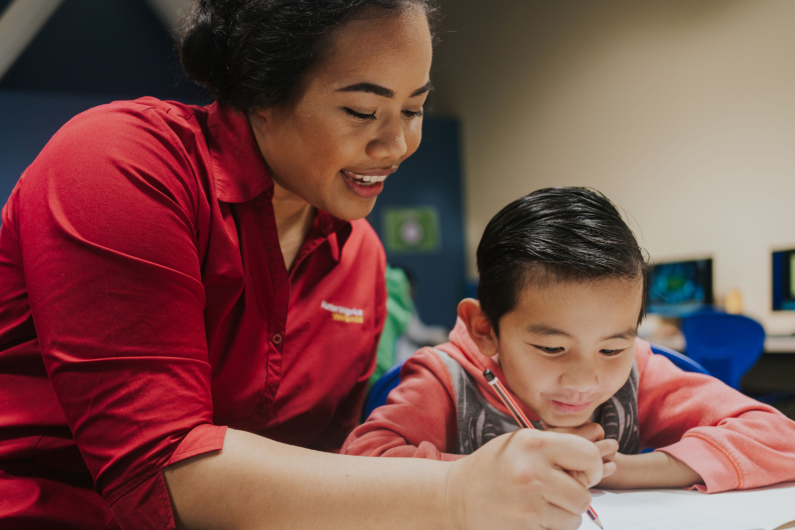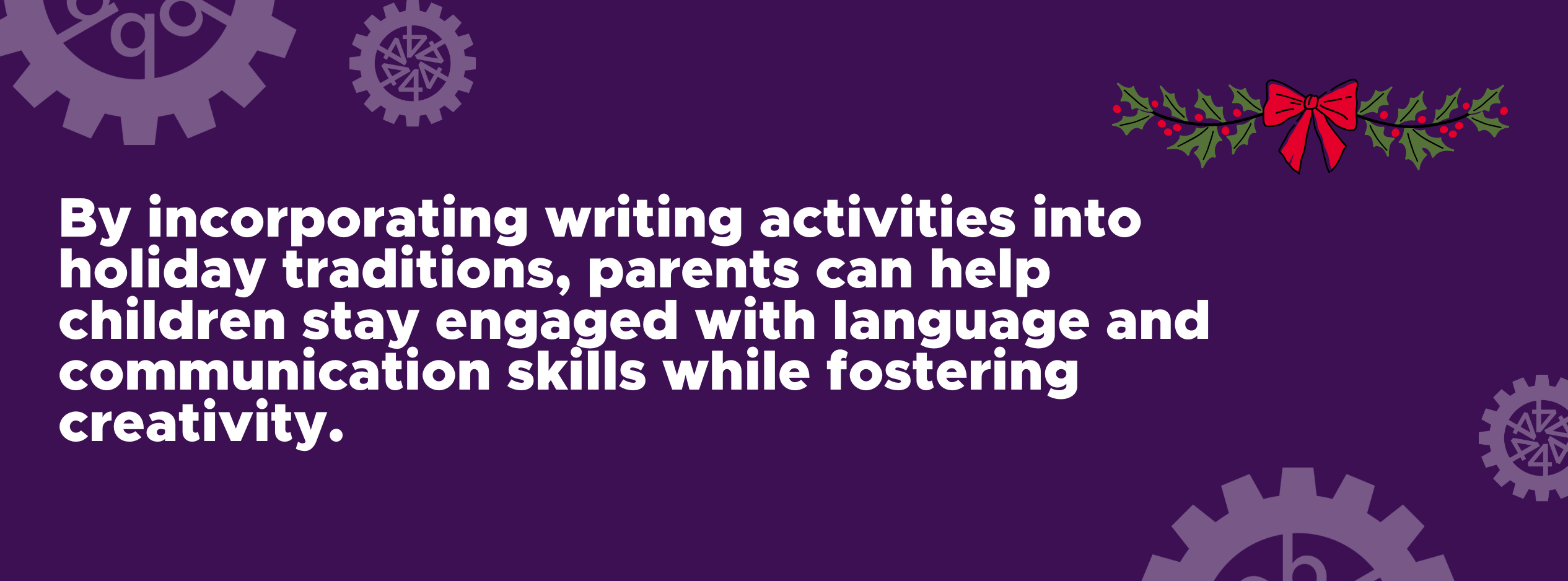Fun Ways to Encourage Writing During The Festive Season

The festive season is a time for families to come together, celebrate, and create lasting memories. But amid the excitement of gift-giving, festive meals, and holiday activities, it's easy for children to take a break from their usual learning routines. However, the holidays offer a unique opportunity to encourage writing in a way that’s fun, creative, and tied to the season's special moments. By incorporating writing activities into holiday traditions, parents can help children stay engaged with language and communication skills while fostering creativity. Here are some creative ways to encourage writing during the festive season.

Write Christmas Cards for Teachers and Friends
One of the simplest and most enjoyable ways to encourage writing during the holiday season is by having children write Christmas cards for their teachers and friends at school. Not only does this give children a chance to express their gratitude, but it also helps them develop their writing skills in a practical, meaningful way.
Writing cards can range from short, heartfelt notes to a little longer messages depending on the child’s age. For younger children, a simple “Merry Christmas” and a drawing might be all that’s needed, while older children can practice writing messages that include specific memories from the school year or wishes for the coming year. It's also a great chance to introduce children to the structure of letter writing, with a greeting, body, and closing. Additionally, children can get creative by decorating the cards with festive drawings, stickers or glitter, making it an enjoyable and artistic activity.
Writing Christmas Cards for Family Members
The holiday season is a time for sharing love, joy, and gratitude with those closest to us, and one of the most heartfelt ways to do this is through a personal Merry Christmas card. For children, writing their own Christmas card to a family member can be a fun and meaningful way to practice writing, express emotions, and reflect on the importance of family bonds.
Encourage your child to think about what makes that family member special to them. Whether it’s their kindness, their sense of humour, or the special memories they share, these thoughts can form the heart of a personal Christmas card. For younger children, even just writing a simple “Merry Christmas” followed by a drawing or a festive sticker can be meaningful. For older children, this could evolve into a more thoughtful note, where they can write about a cherished moment from the past year or express their appreciation for that person’s role in their life.
For example, a child might write something like, “I love spending Christmas with you because we always have so much fun together. Thank you for all the hugs and stories you share with me. Merry Christmas, Grandma!” This sort of personal message not only makes the recipient feel loved but also helps the child reflect on what they appreciate most about their family members.
Keep a Daily Holiday Journal
The festive holiday period is full of unique experiences, from decorating the tree to the excitement of counting down to Christmas Day. Encourage children to document these daily events in a holiday journal. Writing about their day-to-day experiences helps children sharpen their writing while fostering a deeper connection to the season.
Children can use their journal to describe what they did each day – from playing with friends or visiting Santa to enjoying a special meal with family. They can also write about the weather, the sights and sounds of the holidays, or the different foods they ate. For younger children, a journal prompt like “What was the best part of today?” can help get them started, while older children can expand their entries with more detail, describing the colours, smells, and sounds of the season. If they’re feeling particularly creative, they could add a bit of storytelling flair by inventing holiday adventures or imagining a day in the life of a Christmas elf or reindeer.
Not only does journaling provide a fun way for children to express their thoughts, but it also serves as a beautiful way to capture their memories. At the end of the holidays, they’ll have a personal account of their festive experiences to look back on, and it can even be shared with the class when school resumes.
Label Each Present with Personalised Notes
Gift-giving is one of the most exciting parts of the holidays, and writing personalised notes for each gift is a great way to involve children in the process. Rather than simply writing names on gift tags, encourage your child to write a special message or description of the gift on each tag.
This could be as simple as writing “To Mum, with love” or “For Dad, something to make you smile.” Older children might enjoy writing a sentence or two about why they chose that particular gift for someone or even a short poem about what they hope the recipient will enjoy. This small but meaningful act reinforces the spirit of giving and ensures that each present is given with intention and thought. Children will feel involved in the gift-giving process, and their writing will add a personal touch to the celebration.
Create a Holiday Recipe Book
The holidays are filled with special foods, from Christmas dinner to sweet treats like cookies and Christmas mince pies. Creating a holiday recipe book is a fun way to incorporate writing into holiday traditions. Children can write down their favourite holiday recipes, whether they’re family traditions passed down through generations or brand new ones they’ve enjoyed during the season.
To begin, children can write out the ingredients and steps for recipes they want to remember or share. This is a great opportunity for children to develop their writing skills by following the structure of recipe writing, such as clear instructions and organised ingredients. For older children, you could encourage them to add their own personal spin on a recipe or even write a short story about the memories tied to a particular dish – such as baking cookies with a grandparent or preparing a special meal for a holiday party.
If the children enjoy art, they can also illustrate the recipes or take photos of the finished dishes. This combination of writing and creativity makes the recipe book a cherished family keepsake that can be passed down for years to come, preserving the stories and memories associated with holiday meals.
Write a Holiday Poem or Story
What better time to spark creativity than the holidays? Writing a holiday-themed poem or short story is a fantastic way to engage children’s imaginations while also encouraging them to write. Whether it’s a poem about the magic of Christmas or a whimsical story about a snowman who comes to life, writing holiday tales allows children to explore their creativity and experiment with different writing styles.
You could encourage children to write about a holiday adventure they’d like to go on, a magical encounter with Santa or the Grinch, or even invent a brand-new holiday tradition. If they’re feeling inspired, older children might enjoy writing longer stories with more developed characters and plots. For younger children, a simple rhyming poem about winter or Christmas decorations can be just as fun.
For families with multiple children, you can even create a collaborative holiday story, with each child contributing a sentence or paragraph to build a larger tale. This not only helps children work together but also promotes creativity, teamwork, and a love of writing.

Conclusion
The festive season is the perfect time to get children writing in ways that are creative, engaging, and meaningful. Whether they’re writing Christmas cards, keeping a holiday journal, or crafting original stories, there are countless opportunities to incorporate writing into holiday traditions. With a bit of creativity, writing can become a fun and treasured part of the holiday season, leaving children with lasting memories and a love for expressing themselves through words.
If you feel that your child could benefit from extra English support after the holidays, our team of expert tutors is here to help. Simply book a FREE, no-obligation learning assessment online to get started.




